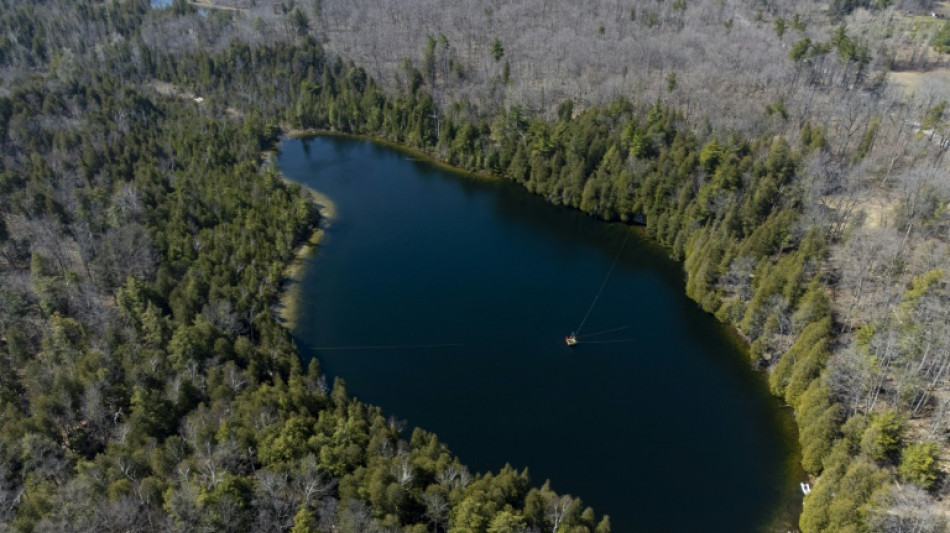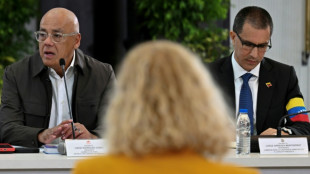
-
 UK royal finances in spotlight after Andrew's downfall
UK royal finances in spotlight after Andrew's downfall
-
Diplomatic shift and elections see Armenia battle Russian disinformation

-
 Undercover probe finds Australian pubs short-pouring beer
Undercover probe finds Australian pubs short-pouring beer
-
Epstein fallout triggers resignations, probes

-
 The banking fraud scandal rattling Brazil's elite
The banking fraud scandal rattling Brazil's elite
-
Party or politics? All eyes on Bad Bunny at Super Bowl

-
 Man City confront Anfield hoodoo as Arsenal eye Premier League crown
Man City confront Anfield hoodoo as Arsenal eye Premier League crown
-
Patriots seek Super Bowl history in Seahawks showdown

-
 Gotterup leads Phoenix Open as Scheffler struggles
Gotterup leads Phoenix Open as Scheffler struggles
-
In show of support, Canada, France open consulates in Greenland

-
 'Save the Post': Hundreds protest cuts at famed US newspaper
'Save the Post': Hundreds protest cuts at famed US newspaper
-
New Zealand deputy PM defends claims colonisation good for Maori

-
 Amazon shares plunge as AI costs climb
Amazon shares plunge as AI costs climb
-
Galthie lauds France's remarkable attacking display against Ireland

-
 Argentina govt launches account to debunk 'lies' about Milei
Argentina govt launches account to debunk 'lies' about Milei
-
Australia drug kingpin walks free after police informant scandal

-
 Dupont wants more after France sparkle and then wobble against Ireland
Dupont wants more after France sparkle and then wobble against Ireland
-
Cuba says willing to talk to US, 'without pressure'

-
 NFL names 49ers to face Rams in Aussie regular-season debut
NFL names 49ers to face Rams in Aussie regular-season debut
-
Bielle-Biarrey sparkles as rampant France beat Ireland in Six Nations

-
 Flame arrives in Milan for Winter Olympics ceremony
Flame arrives in Milan for Winter Olympics ceremony
-
Olympic big air champion Su survives scare

-
 89 kidnapped Nigerian Christians released
89 kidnapped Nigerian Christians released
-
Cuba willing to talk to US, 'without pressure'

-
 Famine spreading in Sudan's Darfur, UN-backed experts warn
Famine spreading in Sudan's Darfur, UN-backed experts warn
-
2026 Winter Olympics flame arrives in Milan

-
 Congo-Brazzaville's veteran president declares re-election run
Congo-Brazzaville's veteran president declares re-election run
-
Olympic snowboard star Chloe Kim proud to represent 'diverse' USA

-
 Iran filmmaker Panahi fears Iranians' interests will be 'sacrificed' in US talks
Iran filmmaker Panahi fears Iranians' interests will be 'sacrificed' in US talks
-
Leicester at risk of relegation after six-point deduction

-
 Deadly storm sparks floods in Spain, raises calls to postpone Portugal vote
Deadly storm sparks floods in Spain, raises calls to postpone Portugal vote
-
Trump urges new nuclear treaty after Russia agreement ends

-
 'Burned in their houses': Nigerians recount horror of massacre
'Burned in their houses': Nigerians recount horror of massacre
-
Carney scraps Canada EV sales mandate, affirms auto sector's future is electric

-
 Emotional reunions, dashed hopes as Ukraine soldiers released
Emotional reunions, dashed hopes as Ukraine soldiers released
-
Bad Bunny promises to bring Puerto Rican culture to Super Bowl

-
 Venezuela amnesty bill excludes gross rights abuses under Chavez, Maduro
Venezuela amnesty bill excludes gross rights abuses under Chavez, Maduro
-
Lower pollution during Covid boosted methane: study

-
 Doping chiefs vow to look into Olympic ski jumping 'penis injection' claims
Doping chiefs vow to look into Olympic ski jumping 'penis injection' claims
-
England's Feyi-Waboso in injury scare ahead of Six Nations opener

-
 EU defends Spain after Telegram founder criticism
EU defends Spain after Telegram founder criticism
-
Novo Nordisk vows legal action to protect Wegovy pill

-
 Swiss rivalry is fun -- until Games start, says Odermatt
Swiss rivalry is fun -- until Games start, says Odermatt
-
Canadian snowboarder McMorris eyes slopestyle after crash at Olympics

-
 Deadly storm sparks floods in Spain, disrupts Portugal vote
Deadly storm sparks floods in Spain, disrupts Portugal vote
-
Ukrainian flag bearer proud to show his country is still standing

-
 Carney scraps Canada EV sales mandate
Carney scraps Canada EV sales mandate
-
Morocco says evacuated 140,000 people due to severe weather

-
 Spurs boss Frank says Romero outburst 'dealt with internally'
Spurs boss Frank says Romero outburst 'dealt with internally'
-
Giannis suitors make deals as NBA trade deadline nears


To track human impact on Earth, scientists probe Crawford Lake
On first glance, it looks like just another small lake in Canada, one of thousands across the vast country. But the view under the surface of Crawford Lake outside Toronto tells a very different story.
Scientists believe the lake's exceptionally well-preserved sediment layers serve as a reference point for a proposed new geological chapter in the planet's history, defined by the considerable changes wrought by human activity: the Anthropocene.
For years, geologists have tried to find the Anthropocene's so-called "golden spike" -- the spot on Earth with the best evidence of this global transformation.
And Crawford Lake -- located in Ontario province, in the greater Toronto area, is that place, according to the International Commission on Stratigraphy's Anthropocene Working Group, which revealed its decision on Tuesday.
Local legend has it that the lake is bottomless. But in fact, it's the exact opposite -- its depths hold unparalleled riches, a phenomenon that put the lake on the short list to be the "spike" years ago.
The pristinely preserved sediments show better than anywhere else on Earth that humans have irrevocably changed the planet at all levels, including its physical composition.
"It's very deep, but it's not very large. So that means that the waters don't mix all the way to the bottom," explains Francine McCarthy, a professor at Brock University who has led the research into Crawford Lake.
"And so the sediments that accumulate in the lake are not disturbed," she told AFP in April, when samples were taken for the ICS's Anthropocene working group.
- 'Distinct fingerprint' -
For centuries, Crawford Lake has been slowly absorbing signs of change. Everything that once floated on the water's surface is now embedded in some form in its sediments.
The first humans to leave their mark on the lake were Iroquois villagers who built homes along its shores. The sediments then showed the mounting influence of European settlers on the landscape, as trees vanished and new species emerged.
Then in the 20th century, fly ash from the use of coal and other fossil fuels settled in the lake, as cities developed and become more industrialized. Heavy metals such as copper and lead also appear progressively in the layers.
"We can see local disturbance. Or we can look at regional effects (like) pollution, said Paul Hamilton, a researcher at the Canadian Museum of Nature.
The lake's sediments can also document global change, he said, such as atmospheric deposition of chemicals.
For McCarthy, the other sites in contention to be the Anthropocene's "golden spike" did not have "such a distinct fingerprint of exactly what the core looks like and what each year looks like."
"Each year has its own personality, like people," she said.
- 'Everything changed' -
Extracting samples from Crawford Lake that can serve as markers for a new geological period requires skill, precision and speed.
Tim Patterson, a researcher at Carleton University in Canada, and his team are specialists. To recover the sediments from the depths of Crawford Lake without damaging them, they fill huge metal tubes with dry ice and alcohol.
The tubes -- about two meters (6.5 feet) long and 15 centimeters wide -- are then plunged into the lake's bed for 30 minutes, so that the sediments can freeze onto them, forming a series of distinct lines for each year, like the rings of a tree.
In April, what interested Patterson the most was traces of plutonium.
The start of the Anthropocene has been set in 1950 "to pick up something that was utterly unique in the history of the world. It was this nuclear testing in the air," he explained.
"Humans had never done that before. And that leaves a record, not just regionally but all around the world."
McCarthy, who has been working at Crawford Lake for nearly four decades, says 1950 also marks when humankind entered into a seemingly endless cycle of consumption, production and pollution.
"So for 12,000 years, it was happening the same way. And then suddenly, very suddenly, within a few years, everything changed," she told AFP.
But McCarthy nevertheless remains hopeful for the future.
"If geologists, who after all are the people who found the plutonium in the rocks and the petroleum in the rocks, if they accept that there is a fundamental change that's due to humans, then maybe action will be taken," she said.
Z.AlNajjar--SF-PST




